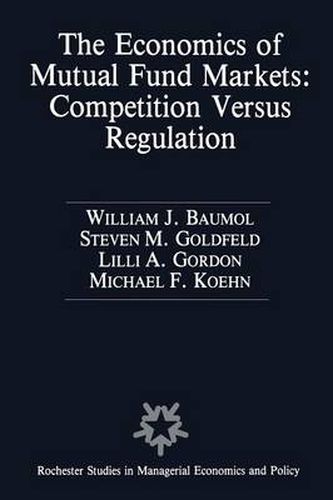Readings Newsletter
Become a Readings Member to make your shopping experience even easier.
Sign in or sign up for free!
You’re not far away from qualifying for FREE standard shipping within Australia
You’ve qualified for FREE standard shipping within Australia
The cart is loading…






This title is printed to order. This book may have been self-published. If so, we cannot guarantee the quality of the content. In the main most books will have gone through the editing process however some may not. We therefore suggest that you be aware of this before ordering this book. If in doubt check either the author or publisher’s details as we are unable to accept any returns unless they are faulty. Please contact us if you have any questions.
The original impetus for this research was provided several years ago by a request to assist Counsel for Fidelity Management and Research Corporation in analyzing the mutual fund industry, with particular emphasis on money market mutual funds. We were asked to focus our efforts on the mechanism by which the advisory fees of mutual funds are determined. This request arose out of litigation that challenged the level of advisory fees charged to the shareholders of the Fidelity Cash Reserve Fund. Subsequently, we were asked to provide similar assistance to Counsel for T. Rowe Price Associates regarding the fees charged to shareholders of their Prime Reserve Fund. 1940, advisers of Under the Investment Company Act of mutual funds have a fiduciary duty with respect to the level of fees they may charge a fund’s shareholders. Since the passage of the Investment Company Act, there have been numerous lawsuits brought by shareholders alleging that advisory fees were excessive. In these lawsuits, the courts have failed to provide a set of standards for determining when such fees are excessive. Instead, they have relied on arbitrary and frequently ill-defined criteria for jUdging the reasonableness of fees. This failure to apply economic-based tests for evaluating the fee structure of mutual funds provided the motivation for the present book, which undertakes a comprehensive analysis of the economics of the mutual fund industry.
$9.00 standard shipping within Australia
FREE standard shipping within Australia for orders over $100.00
Express & International shipping calculated at checkout
This title is printed to order. This book may have been self-published. If so, we cannot guarantee the quality of the content. In the main most books will have gone through the editing process however some may not. We therefore suggest that you be aware of this before ordering this book. If in doubt check either the author or publisher’s details as we are unable to accept any returns unless they are faulty. Please contact us if you have any questions.
The original impetus for this research was provided several years ago by a request to assist Counsel for Fidelity Management and Research Corporation in analyzing the mutual fund industry, with particular emphasis on money market mutual funds. We were asked to focus our efforts on the mechanism by which the advisory fees of mutual funds are determined. This request arose out of litigation that challenged the level of advisory fees charged to the shareholders of the Fidelity Cash Reserve Fund. Subsequently, we were asked to provide similar assistance to Counsel for T. Rowe Price Associates regarding the fees charged to shareholders of their Prime Reserve Fund. 1940, advisers of Under the Investment Company Act of mutual funds have a fiduciary duty with respect to the level of fees they may charge a fund’s shareholders. Since the passage of the Investment Company Act, there have been numerous lawsuits brought by shareholders alleging that advisory fees were excessive. In these lawsuits, the courts have failed to provide a set of standards for determining when such fees are excessive. Instead, they have relied on arbitrary and frequently ill-defined criteria for jUdging the reasonableness of fees. This failure to apply economic-based tests for evaluating the fee structure of mutual funds provided the motivation for the present book, which undertakes a comprehensive analysis of the economics of the mutual fund industry.